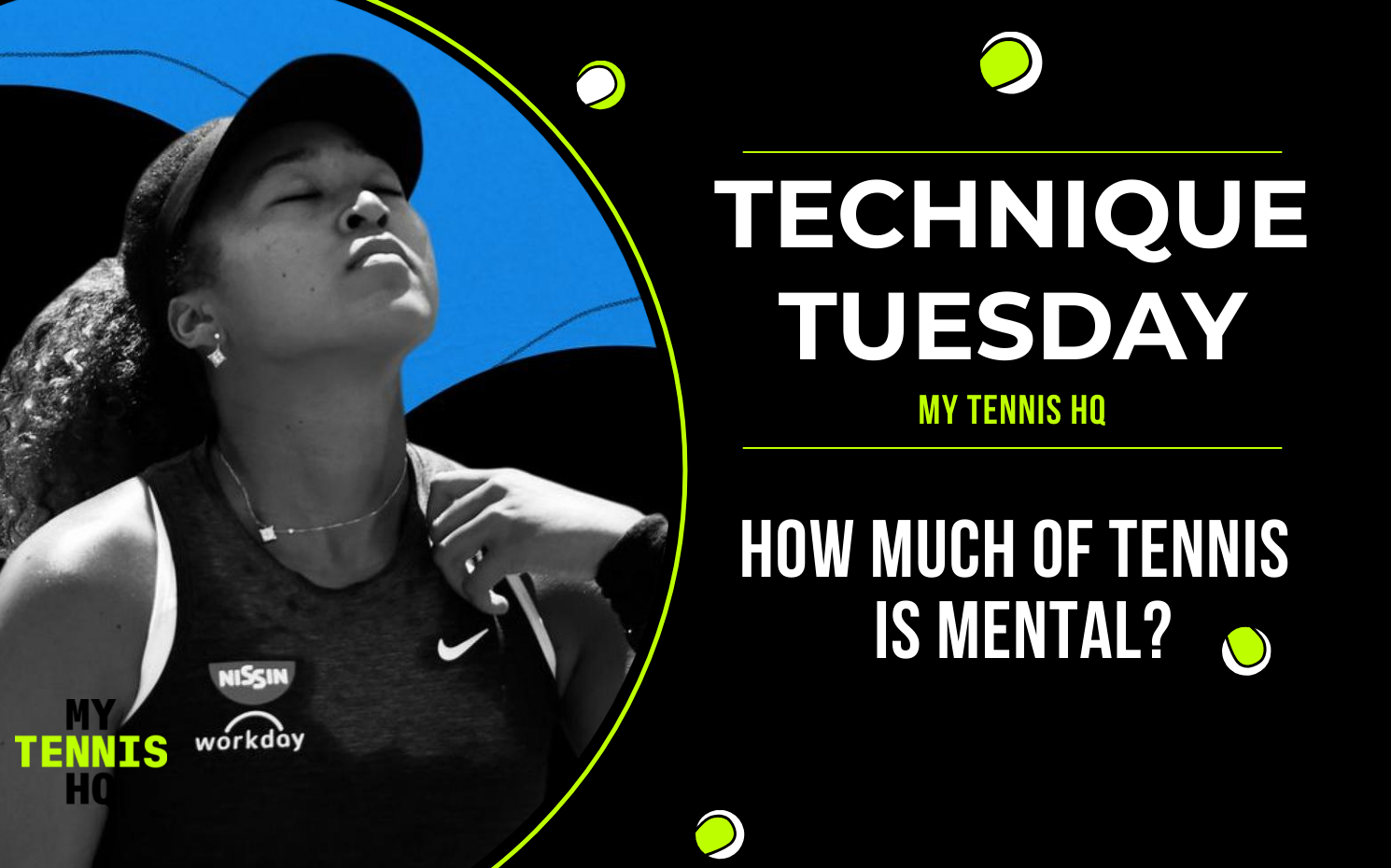
This article was originally posted on My Tennis HQ. For more articles like this discussing tennis techniques, check out their website here.
How Much Of Tennis Is Mental?
Let me tell you a quick story. A couple of years ago I was playing the second round of a 25K tournament against an upcoming player. I was 24 years old and he was 19 and had recently turned pro. He was undeniably talented and had incredibly powerful strokes. However, his attitude on the court was, to put it mildly, poor. He was complaining about every call, getting frustrated about the smallest inconveniences and after I won the first set he smashed his racket. He was so obnoxious that it made me want to beat him even more. When I closed him out in two sets I remember yelling towards my parents in the stands “It is all mental!! It is all mental!!”. I ended up winning that event.

When I look back to the tournaments I had success in my career, the part I vividly remember is how my mind was in the right place during those weeks. It is hard to explain why I felt that way, but I was just focused, poised, and nothing was going to stop me. I did not win those events because my game drastically improved, I did it because I felt mentally strong. This feeling of being “in the zone” is incredibly hard to replicate week in and week out. In tennis, success and failure walk hand in hand and we have several setbacks we have to face. All of us tennis players go through this and our ability to overcome problems on and off the court is key in our pursuit of success.
Below we will dive deeper into the mental side of tennis. Specifically, we will cover what being mentally strong means, some key elements of mentally strong players and the correlation between mental strength and good results. We will also give you a few tips on how to improve your mental game (we are working on a more comprehensive guide on how to improve your mental toughness!!), so let’s get to it.
Mental Strength and Tennis
Let me preface by saying that the physical work in tennis is incredibly important. Having a good work ethic in practice, developing your strokes and physical strength is imperative for improving as a tennis player. This is especially important when you are beginning your tennis journey and learning how to properly hit every shot. However, as you reach a competitive level, you will be measuring yourself against players who have done similar work as you. Whoever is on the other side of the court also practiced their strokes and worked on their fitness so the outcome of a match is decided by who can navigate the tennis match better. Of course, one player might have clear physical advantages or more developed strokes (very common in junior tennis) than the other. But the difference between a mentally strong vs a mentally weak player is that mentally strong players are able to extract the maximum output out their tennis capabilities while enduring the pressures of a tennis match. You can’t control the outcome of the match (sometimes you’ll just be outplayed), but you can control how hard you fight for every point.

Think of it this way. As we develop our tennis game we slowly build what I call a “tennis identity”. What this means is that we all have our own unique way to play tennis. First, we typically favor one stroke over another. For example, I always felt more comfortable hitting backhands over forehands. While I worked very hard to develop my forehand, it will never be as natural as my backhand. In addition to the strokes, there is also our style of play. Some players enjoy being aggressive and taking risks while others love to counterpunch. Regardless of your preferences, we all have a tennis identity and understanding who you are as a tennis player is the first step towards becoming a mentally strong player. By doing so, you’ll be able to understand your strengths and shortcomings during a tennis match and work towards making the proper adjustments. Self-awareness is the first component of becoming a mentally strong tennis player.
Real Live Example

Last Sunday (March 1rst 2020), Thiago Seyborth Wild won the ATP 250 in Santiago, Chile. He is the first player born in the 2000s to win an ATP tour event. The 19 year old is one of the best players to come out of Brazil in a long time. In 2018, Wild won the junior US Open and since then, the expectations about his professional career drastically increased. Up until last week, his brief career had ups and downs. While he was steadily rising up the rankings, it appeared he was being held back by where he was mentally. The transition from juniors to pros and difficult for everyone and expectations are high for accomplished junior players like Wild. After Sunday’s title, his coach Joao Zwetsch credited a lot of the win to Wild’s maturing on and off the court. He said that the addition of the sports psychologist Felipe Vardiero to the team was essential for Wild’s rise. This is a fantastic example of how mental strength can elevate someone to a different level. Wild is unquestionably an excellent tennis player who has all the weapons to play at the highest level but he was being held back mentally. However, Thiago and his team have done a tremendous job creating an environment where the player is developing technically, physically and mentally and his title in Santiago demonstrates just that.
In professional tennis we often see commentators talking about a player’s mental strengths. The big 3 are praised for their abilities to overcome challenges and continue to develop their game in order to stay ahead of the competition. Federer, Nadal and Djokovic are the gold standard when it comes to mental toughness. On the other hand, we also see the discussions about players who are immensely talented but fail to live up to the expectations. The biggest example of this is Nick Kyrgios. The australian is a wizard with the tennis racket but struggles with the mental aspect of the game. I am not here to judge him, he appears to be happy with his career and with who he is and personally I think he is great for tennis. But we can agree that he has not reached his full potential. Nick is definitely not alone, we’ve seen other players like Zverev and Tsisipas having big mental breakdowns on the court in 2020 alone. In my assessment, the dubbed “next gen” is as talented as Novak, Rafa and Roger, but they are nowhere near as mentally strong as the big three.
Aspects of Mental Strength You Should Develop
Mental Toughness:
Mental toughness is a hard subject because some of us are just better at it than others. However, it is something we can all improve upon and it will be beneficial on and off the court. In tennis, being mentaly tough is all about how a player can navigate the ups and downs in tennis. A mentally strong player is self aware of his/her shortcomings but not scared to fail because of them. They are disciplined and eager to improve despite frustrations and setbacks. In addition, they are able to accept their mistakes and continue to strive to get better. During matchplay, mentally strong players are able to handle pressure situations more clearly, especially during the important stages of the match. Finally, a mentally strong player understands that improving in tennis takes time and there will be setbacks and uncontrollable factors. The only thing we can control is our attitude and how we overcome obstacles.
17 time Grand Slam Champion Gigi Fernandez has dedicated herself towards teaching mental toughness since her retirement. Fernandez says that working with a sports psychologist changed the course of her career. She now gives workshops on mental toughness and in an interview in 2019 she said the following:
“There’s not one thing about mental toughness that you can tell your students that will make them get better right away because mental toughness is very dependent on the situation, there’s not a straight line to mental toughness and there’s a lot of things you have to do off court before the match. You have to understand yourself and the physiology of your body under pressure. You have to try to learn tricks to counter the feelings you have when you’re competing. You have to set goals for yourself. If you want to do anything in life, you have to set goals”
You can read the rest of the interview here.
Decision Making:
Decision making is incredibly important because it often dictates how the match is played. If during pressure situations you make the wrong decisions, it won’t matter how great your strokes are or how physically fit you feel. Being able to clear the mental fog that comes with pressure in order to make the proper decisions during a match is massively important. We’ve all experienced playing a match where we were in full control but we were unable to close it out; the good old “choking”. As the finish line gets closer and closer, the pressure increases and it can cloud our judgment. All of us experienced this at one point. The key is to learn from those experiences in order to make better decisions in the future.
Positive Attitude:
It goes without saying that maintaining a positive attitude through adversity is incredibly important for developing mental strength. In tennis, losing is as much part of the game as winning. Therefore, players need to look to learn from every match. Sometimes your opponent has a better day and there is nothing you can do but if you give 100% you can be proud of yourself. On top of that, pay attention to what you did well and what you can improve on so you can work appropriately next time you hit the practice court.
Conclusion
Mental strength and toughness are hard. It is something you need to work on as hard as you work on your serve or forehand. Yet a lot of us (including myself) don’t put in as much work into our minds as we should. Pressure, negative emotions, lack of confidence, all those things affect us differently as tennis players and it can be scary to face those challenges because we are afraid off failure. It took me a long time to mature into the player I am today. If I could go back in time and give myself one piece of advice it would be to work harder on my mental toughness early on in my career. You won’t become mentally stronger by reading this article but I hope you feel compelled to put more work between your ears. I guarantee it will be beneficial!



